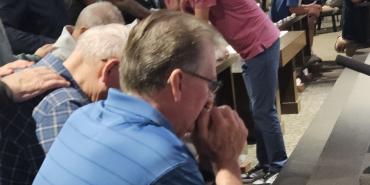The Church of the Nazarene and the Changing World: The Forum

Q: As a pastor, I am often asked our denomination's official stance on creation and evolution. How do Nazarenes understand the origin and development of our universe?
A: The Church of the Nazarene's statement about creation is paragraph 903.8 of the 2005-2009 Manual. The statement affirms that God is the Creator, and it accepts as valid all scientifically verifiable discoveries. The creation resolution includes these biblical words: "In the beginning God created the heavens and the earth" (Genesis 1:1). The appendix concludes by saying "we firmly believe that God is the Creator." These words emphasize the central role that theology plays in the denomination's stance on origins issues. It is worth noting that the 2005 General Assembly changed the creation statement slightly. In its previous version, the statement said Nazarenes "oppose any godless interpretation of the evolutionary hypothesis." In the new version, "evolutionary hypothesis" is replaced by the more general statement, "origin of the universe and of humankind."
The statement leaves open the question of which current origins theories best correspond with or support the affirmation that God is Creator.
Nazarenes could affirm, for instance, theories such as progressive creationism, intelligent design, young-earth creationism, or theistic evolution as long as they also affirm that God is Creator. As one Nazarene leader stated at a recent conference: "We do not draw a line in the sand and demand adherence to any one view. One can believe that God created all things in a seven-day period of 24-hour days or that God employed some form of 'gradual creation' or 'continuing creation' that encompassed millions of years. You can believe either view and be a good Nazarene."
You asked in particular about theistic evolution. Nazarenes can embrace theistic evolution, as long as they interpret the origin of the universe or of humankind in a way that includes an explanatory role for God's creative work. —tjo
Q: In 1996, a report about the future of the Church of the Nazarene was issued called "A.D. 2025." It portrayed a rather grim future if we kept on our current course in a changing world, and it called for some drastic changes. How can we adapt the Church of the Nazarene to a changing world with a gospel that remains the same?
A: The Hiram F. Reynolds Institute research group chaired by Robert H. Scott served as a "think tank" for the Board of General Superintendents (BGS) during the 1993-1997 quadrennium. This group created the "A.D. 2025" document as a picture of what the denomination could become in the future. Much of the thought and vision of the Reynolds Institute continues to be a guiding light for church leadership.
During the past quadrennium, the general superintendents created another "think tank" called the BGS Thought Partners (BGSTP) (see the March/April 2006 issue of Holiness Today). It is designed to be pragmatic, mission focused, and futuristic in thinking. This group of seven leaders is charged with the responsibility to determine, with the BGS, the critical issues facing the church. As these issues are ascertained, the BGSTP will process them with a wide range of leaders from all levels of the global church, seeking creative, practical, biblically based strategies to help "adapt" the Church of the Nazarene for greater missional effectiveness.
These strategies will ultimately be presented to the BGS to equip them to make better informed decisions in their leadership of the church.
I anticipate that this will probably result in a new BGS vision of what the church can be in 2025 with strategies for vision accomplishment. Their action plans may also include resolutions presented to the 2009 General Assembly for final decisions.
The year 2008 will mark our denomination's centennial. It is appropriate at this time to celebrate the past with its abundant blessings of God on the people called Nazarenes. Obviously, we must not linger long in our backward look. Any institution that has more memories than dreams has a questionable future. To realize God's desired future, we must dream largely, plan strategically, act courageously, pray fervently, and place our faith firmly in the One who is the Head of the Church, who alone can help us fulfill His purpose for us. —jlb
Please note: All facts, figures, and titles were accurate to the best of our knowledge at the time of original publication but may have since changed.




